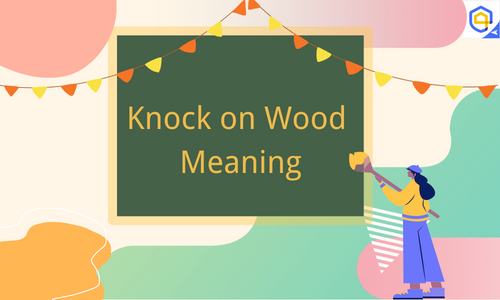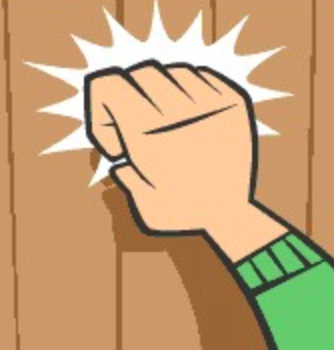The Meaning and Origins of Knock on Wood
Have you ever crossed your fingers or knocked on wood? Most of us do it when trying to stay optimistic, hoping something will happen in our favor. But did you know that knocking on wood is a superstition with deeper meaning and surprising origins?

The truth is that this beloved superstitious tradition dates back to ancient times when people were more closely connected with nature and mythology and continues to carry great spiritual power in cultures around the world today. Intrigued yet? Read on to discover the true meaning behind knocking on wood!
1What Does Knock on Wood Mean
"Knock on wood" is an age-old phrase that parents first taught their children as a way of conveying positive messages. This phrase has long been a part of English and has cultural significance for many people. Generally, when someone utters those three words, they express that they want to halt any potential bad luck.
It's often used after saying something positive out loud, as if knocking on a piece of wood would bring luck or prevent bad things from happening to the words just spoken. Many people aren't sure why they say this phrase, yet we continue to pass it down from one generation to the next.
By giving the same message of hoping for good fortune each time it is uttered, 'knock on wood' symbolizes an important commonality throughout our shared history. Whether you believe in the power of this phrase or not, it never hurts to knock on wood!
2The Origin of Knock on Wood
The phrase 'Knock on Wood' has been around for centuries. It's one of those timeless expressions with a never-ending mystery about its origin. It stirs curiosity in all of us – almost like an ancient secret hidden deep beneath thick layers of folklore. It goes back centuries, but many speculate that its precise beginning is unknown.

Some historians seem to think that this phrase derives from pre-Christian religions and superstitions – during times when spirits and deities were abundantly present in everyday life. Trees have been intrinsic parts of major cultural myths since Babylonian days, so it shouldn't be a huge surprise that people regarded wood as capable of absorbing negative energy and gifting positive luck.
Protective magic was practiced by peoples all over the world— including Norsemen, French Huguenots, and British Celts, among others—and tales hint they may have sourced what we know now as knocking on wood from ceremonies involving shaving small coins or paper images of animals into trees while asking for divine protections.
All these ages ago, it is thought that tree trunks were tapped with an open hand as monikers for attempting supernatural fortunate prayers encouraging safety in every area, such as hobbies, wealth success, marriage contentment, and more. Others think it goes back to ancestor worship when people believed they could physically reach out and touch their ancestry, which they held dear, and even farther along in history to an expression of reverence from when such objects were considered holy by different religions.
Today, the phrase continues to symbolize hope and wishing for good fortune. Knocking three times on any solid surface is thought to still convey similar messaging, with different cultures believing in various meanings attached to the number of knocks used. Whether you choose to trust it or not, superstitious beliefs continue today, and "knocking on wood" remains one of the most popular expressions heard worldwide.
3Why Do We Knock on Wood
Throughout the ages, people have been tapping on anything wooden for luck. But why do we, modern societies include, still participate in ancient rituals such as these related to wood?
Well, one thing is that while technology has made mundane tasks much easier and given us access to the world's information at our fingertips, it can't protect us from bad luck like eliciting a knock on wood.
Parents use this old familiar gesture of asking for protection or good luck to instill in their children the power of positive thinking or believing in one's strength. Even though in a modern-day context, we rely on the internet and have coined our terms and phrases like "touch wood," parents across history used this phrase to impart joy, comfort, and hope during dire times such as war, famine, or other misfortune.
It may be seen today more as a saying instead of actual practice. However, it is still thought of fondly because it helps us remember that some customs remain timelessly true no matter how modern.
4How to Use Knock on Wood
Believe it or not, "Knock on Wood" isn't just a relic of old superstitions. Even amongst teenagers and children in the modern age, it's still used as a playful way to ward off bad luck. Just visit any internet comment section— it pops up with surprising frequency! On the internet, it takes the form of sending virtual wood-tapping good vibes!
When you need a bit of luck, there are a few ways you can take to participate in this age-old ritual properly. First, locate something wooden— like a table, chair, or door frame— and tap it three times with your knuckles. Then, say the phrase out loud: "Knock on wood!"
However, it may not always be convenient to knock on wooden furniture. To solve this problem, clever merchants created small wooden blocks or plaques with the phrase "Knock on Wood" printed on them, allowing people to carry them around and use them for prayer wherever they go.

You can also partake in this tradition even if you don't have a wooden object around. Instead, cross your fingers three times while saying the phrase aloud. Here are some examples: "I'm going to ace this test – *knock on wood*," "My team has a good chance at winning this game – *knock on wood*."
It has even spread into other forms of communication, like text messages where the letters "knock on wood" can be used instead of a full phrase. Regardless of how it's said, knock-on-wood is still an exciting way for young and old alike to mark the moment and enjoy superstitious fun!
5What Is the Difference between Knock on Wood and Touch Wood
While Knock on Wood and Touch Wood have a similar purpose – wishing away bad luck or avoiding future misfortune – they differ.
So how do these two expressions, which essentially mean the same thing differ? To 'knock on wood' involves a person knocking briefly on a door or wall made of wood while saying the phrase, usually three times, to obtain good luck.
Conversely, to 'touch wood' entails making physical contact with an object made of wood while repeating the phrase aloud – again typically three times – with the same intention of garnering some good fortune.
Generally speaking, "knock on wood" is directed at yourself; it's like wishing you good luck, whereas "touch wood" usually applies more often when discussing another person's luck or fortune.
6How to Know If Your Child Used "Knock on Wood" in Their Messages
With technological advances, teens have become ever savvier with their words and have devised an interesting phrase to throw off parents. One such activity is using an expression called "knock on wood," most commonly found in text messages.
For example, suppose you notice the word "knock on wood" or emojis like "fingers crossed" or "knock on wood" woven into your teen's texts or social media posts. Another telltale sign is if your teen suggests to a friend that they knock on wood or if they talk about something being "touched" or "knocked" for luck.
Modern parents should understand that being able to read their child's text messages is an important tool in monitoring their behavior. This is where parental control apps like the AirDroid Parental Control app can help. With this app, you can view your child's text messages and ensure they are not using inappropriate code words or expressions.

AirDroid Parental Control is the ultimate solution for Android users looking to keep their children protected. With it, parents can easily locate family members, track location history, monitor app usage, and regulate screen time.
The first step to taking advantage of AirDroid Parental Control is to create an account and download it on both your device and your child's. Once you have connected these devices, you can easily monitor all activity from the app dashboard - see who they are talking with at any given time and what content they may be discussing. This can help parents identify code words or phrases like "knock on wood" in their child's messages and ensure they are not engaging in inappropriate activities.
Wrapping Up
Knocking on wood is a centuries-old tradition believed to bring us good luck or ward off bad luck. The practice involves knocking on an object made of wood three times while saying "knock on wood" or "touch wood." It has since evolved into other forms, like texting the letters "knock on wood" instead of repeating the phrase.
Modern parents need to be aware of code words like "knock on wood" and take the necessary steps to monitor them in their child's messages. With parental control apps like AirDroid Parental Control, tracking your child's activity and ensuring they are not involved in inappropriate activities is easy. Download this app today and stay in control of your child's online activity.












Leave a Reply.